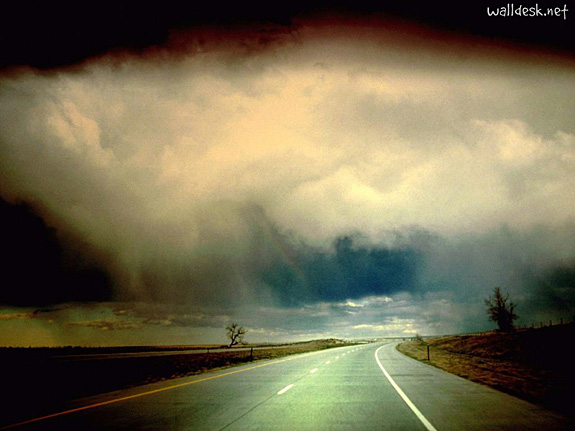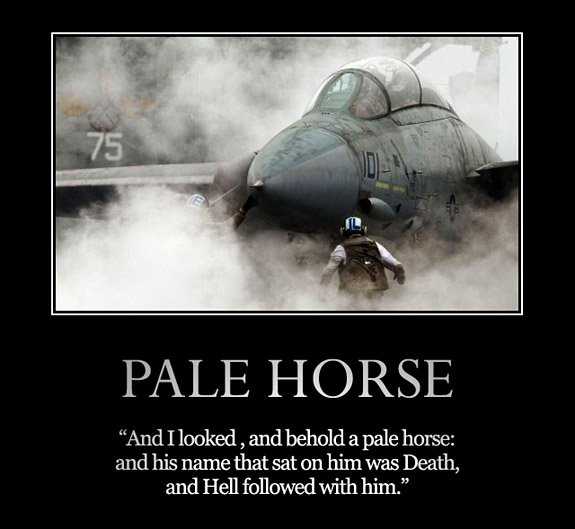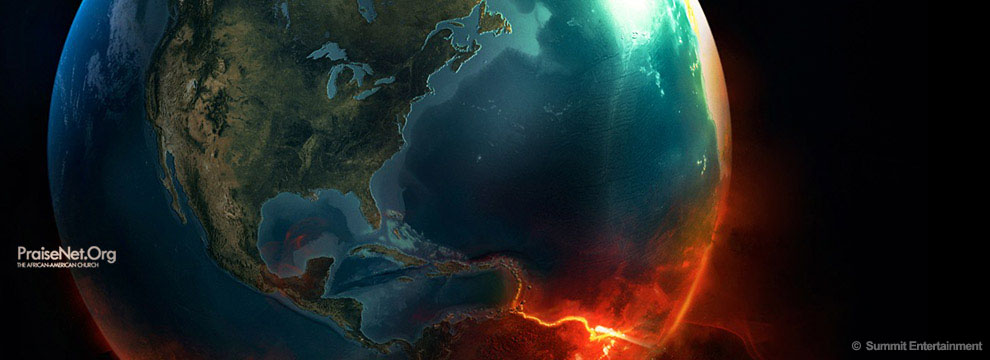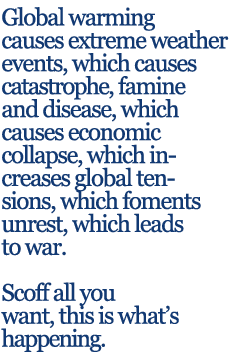
Then I saw in the right hand of him who
sat on the throne a scroll with writing on both sides and sealed
with seven seals. 2 And I saw a mighty angel proclaiming in a
loud voice, "Who is worthy to break the seals and open the
scroll?" I watched as the Lamb opened the first of the seven
seals... 2 I looked, and there before me was a white
horse! Its rider held a bow, and he was given a crown, and he
rode out as a conqueror bent on conquest. 3 When the Lamb opened
the second seal... another horse came out, a fiery red one. Its
rider was given power to take peace from the earth and to make
men slay each other. To him was given a large sword. 5 When the
Lamb opened the third seal... I looked, and there before me was
a black horse! Its rider was holding a pair of scales in his
hand. 6 Then I heard what sounded like a voice among the four
living creatures, saying, "A quart of wheat for a day's
wages, and three quarts of barley for a day's wages, and do not
damage the oil and the wine!" 7 When the Lamb opened the
fourth seal... I looked, and behold
a pale horse: and his name that sat on him was Death, and Hell
followed with him.
—The
Book of Revelation of Jesus Christ to Saint John the Evangelist
Chapters 1 & 2
![]() Biblical prophecy is definitely not user-friendly.
Biblical prophecy is definitely not user-friendly.
You might think God would have made this language more plain, the symbolism more straightforward, if He actually intended us to understand any of this. Biblical scholars continue to debate much of what the books of Isaiah, Daniel and Revelation are actually trying to tell us. Revelation is written in a kind of code: symbols and images revealed to the author while he was imprisoned on a penal island. The John of Revelation is not John The Apostle or John The Baptist but a third, unknown John many biblical scholars refer to simply as John of Patmos (the island he was marooned upon). The strange visions John experienced and wrote about have been interpreted many ways by many people. This book is so strange, in fact, that when the Bible was being canonized at the Third Council of Carthage in 397 AD, The Apocalypse, as they referred to it, was one of seven canonical antilegomena, disputed books, literally, "spoken against." These were books of the New Testament which were not universally accepted by the early Church, but which are now included in the 27 books of the New Testament recognized by almost all Christians. In addition to Revelation, these books included Hebrews, 2 Peter, 2 and 3 John, James and Jude.
The bible divides time into periods we call dispensations. Depending on your denomination (and who you talk to), there are basically three dispensations: Law, Grace and Kingdom, or there are many more; the three subdivided into smaller and more specific periods. Revelation reveals a prophecy for the end of this current dispensation, a time of catastrophe and gloom called The Great Tribulation.
In the bible, the Old Testament took place during the
Dispensation of The Law. Man sinned in the Garden of Eden and
fell from grace. Man’s sin separated him from God, Who is Holy
and without sin. In order to reconcile man back to God, there
needed to be a sacrifice to atone for sin. Not a temporary
solution like the annual Jewish rituals, but a permanent
sacrifice that would, once and for all, satisfy the penalty and
reconcile the creation with The Creator. That sacrifice was
Jesus Christ, Who was God manifested as a human being. Jesus
lived a life without sin, a pure and unblemished existence,
which made Him eligible as a human sacrifice to atone for
mankind’s sin. Through the power of God, Jesus was resurrected
from the dead, and that resurrection—the part of the story many
of us overlook—marked the end of the Dispensation of the Law and
ushered in our current age, the Dispensation of Grace. Under
Grace, God is no longer the Great Galactic Accountant, keeping
track of an endless list of sin enumerated in painstaking detail
(called “The Law”). Today, we are brothers, what the bible calls
“Joint Heirs” with Jesus Christ [Romans 8:17]. Jesus is our
intercessor, sort of like a lawyer, who stands between us and
God and interprets the idiotic things we say to God, filtering
out our ignorance and mortality in such a way that shields our
mortal arrogance and sinful nature from God’s presence. Jesus
Christ’s holiness acts like a coffee filter, presenting us not
as we are but as who we are in Him: complete, sinless,
holy. We are, of course, none of those thing. We achieve those
things only through faith in Jesus Christ.
During the Dispensation of Grace, Jesus’ arms are open wide,
welcoming whosoever will come. Salivation is a free gift from
God [Ephesians 2:9], attainable easily and freely simply by
renouncing sin and accepting Christ [I John 1:9]. Salvation has
absolutely nothing whatsoever to do with
church
membership. Baptism is not, n and of itself, salvation.
Salvation is about making a decision to follow Jesus. Baptism is
an act of obedience to scripture and an outward demonstration of
an inner transformation. Being baptized doesn’t mean you’re in
the club. You need to be in the club and then be baptized as a public demonstration of that choice.
Jesus said that natural and economic disasters, wars and disease
are signs that this dispensation is drawing to a close (Luke
Chapter 21]. Think of the Dispensation of Grace like an amnesty
period: all’s forgiven, just promise you won’t sin anymore, ask
for forgiveness, and your slate gets wiped clean. But the
amnesty period expires at a certain day and time. No one knows
when that day will be. Any man who says he knows—like Harold
Camping who predicted May 21, 2011 was “Judgment Day” –is either
wrong or lying to you [Matthew 24:36]. Nobody knows. Jesus
Christ Himself does not know the day or the hour when this
dispensation will draw to a close. Only God The Father knows,
and He’s not saying. The wild spate of catastrophic events we
are currently seeing are not evidence that the dispensation is
over, but are reasonable evidence that the dispensation is
drawing to a close, that we are living in what the bible calls,
“The Last Days.” But, as I mention
here, to God, how long is a day? “The Last Days” could be
weeks, months, could be generations.

The Rapture
The end of the dispensation of grace will be marked by the Rapture of the Church of Jesus Christ. This is, perhaps, the most controversial and fantastic aspect of fundamentalist Christian faith: the belief that believers in Christ will be literally drawn up from the ground to join Jesus Christ, Who will return in bodily form and hover among the clouds. This, frankly, sounds like a fairy tale and is worth the scrutiny it invites. The Apostle Paul never claimed to be a prophet, and he does not quote a source for this contention, but is likely extrapolating oral testimony passed down through the years. The Gospel of Luke, in which Jesus echoes this claim, had not yet been written. I Thessalonians was the first epistle (letter) written by the Apostle Paul, written around A.D. 52—about 49 years after Christ’s resurrection—and is considered the oldest book in the New Testament. Luke’s Gospel, based largely on the Gospel of Mark, was not written until around thirty years later.
“Brothers, we do not want you to be ignorant about those who fall asleep, or to grieve like the rest of men, who have no hope. 14 We believe that Jesus died and rose again and so we believe that God will bring with Jesus those who have fallen asleep in him. 15 According to the Lord's own word, we tell you that we who are still alive, who are left till the coming of the Lord, will certainly not precede those who have fallen asleep. 16 For the Lord himself will come down from heaven, with a loud command, with the voice of the archangel and with the trumpet call of God, and the dead in Christ will rise first. 17 After that, we who are still alive and are left will be caught up together with them in the clouds to meet the Lord in the air. And so we will be with the Lord forever. 18 Therefore encourage each other with these words.” —I Thessalonians 4
As a child, as a new believer, it was easier, decades ago, to
engage this premise. I honestly didn’t think much about it.
These days, biblical scholars continue to claw at this
assertion, splintering off into two main trains of thought: the
premillennialists and the postmillennialists. Premillennialists
(and, I suspect I am one), take this passage rather literally,
and believe that believers in Christ will be bodily removed from
the planet before The Great Tribulation period begins.
Postmillennialists believe all Christianity will endure the
sifting and great shock of The Great Tribulation period, and
only those who endure to the end will be saved.
I’m not sure if the Peter Pan aspect of the mid-air reunion is
the rationale for post-millennialism or not. The rest of the
bible is cloaked in cryptic themes and imagery, like the Four
Horsemen of the Apocalypse, which is open to interpretation. I
doubt anyone believes there will be literal horses: we translate
that prophecy as symbolism of events: conquest (by some: the
antichrist), war, famine, pestilence & death. We don’t believe
in literal horses. But we do believe in literal mid-air
hovering: Christians vanishing from their clothes—just empty
clothes all over. Perhaps open graves. Vanishing, in a twinkle
of an eye, likely under cover of a great disaster or earthquake,
which may provide some plausible explanation of our absence to
those left behind.
I’ve never actually given this much thought. I certainly wish to
be caught up, taken away, before all hell breaks lose here on
Earth, so I’m down for whatever. But most every other part of
this Christian experience exists within the realm of the
plausible, while the Rapture (a word not found in the bible)
exists within the realm of the fantastic and demands a
repression of disbelief and an almost childlike faith.
Truthfully, the way I see it, I don’t need to believe in the
rapture. I need to believe in Jesus Christ. Doubts about
this fantastic idea of flying through the air should not,
biblically, bar me from Heaven. The way I see it, my
relationship with Jesus Christ buys me a ticket for the
ride—whenever that occurs and in whatever form it takes. In
other words, don’t worry about it. Just follow Christ and see
what happens.
The antichrist
Don’t worry about him. Seriously, don’t give this guy a second
thought. Christian conspiracists have gotten rich off scaring
people about who the antichrist might be, that the antichrist is
likely alive somewhere in the world today, that the antichrist
is Barack Obama (see sidebar). The antichrist (note small “a” as
per the King James) may or may not be what the White Horse—the
Conqueror—represents. Most biblical scholars interpret the
antichrist as being a kind of counterfeit Christ, a charismatic
and popular world leader who will accomplish great things,
winning the hearts and minds of great masses of people. The
antichrist will solve complex global political and economic
problems, bringing peace and prosperity to the world. He will
seem, at face value, heroic, a good guy, and he will be adored
by most of the planet. And by peace shall destroy many,
the bible says [Daniel 8:25]
White Christian conservatives have floated this idea that the
antichrist is President Barack Obama (see sidebar) based on some
warped interpretation of Hebrew scripture and, I suppose, the
president’s winning smile. Far from being the beloved
antichrist, President Obama is openly and publicly despised,
mostly by white conservative Americans. While he is demonstrably
more respected globally than at home, Obama has, thus far, not
demonstrated any supernatural abilities or achieved a lasting
peace or economic prosperity. There is no sane or credible
reason to suspect he is the antichrist beyond the simpler truth
that Barack Hussein Obama Is a Black
Man and They Hate Him.
Daniel referred to the antichrist as, “the leader who will come,
the little horn, the beast and the stern faced king.” Ezekiel
refers to the antichrist as Gog, the chief prince, from the land
of Magog. The ancient land of Magog included some of the
territory represented by present day Turkey, Syria, Iraq, Iran,
Georgia, Armenia, Azerbajan, and Russia near the Black Sea. This
suggests the antichrist will likely come from the east. Daniel
received a prophecy from God revealing that the antichrist will
confirm a treaty guaranteeing Israel’s security. Then, after
three and a half years years, the antichrist will set himself up
in the Jewish Temple and proclaim that he is God. This
abomination will initiate the Great Tribulation which will last
three and a half years.
Regardless, you should not spend even a minute worrying about
who the antichrist is. First of all, consult all the Ouija boards you want, you’ll likely be wrong. Second, ferreting out
the mystery of the antichrist is not a Christian duty or
responsibility. Jesus told us to go and make disciples of all
nations, not to huddle in basements wringing our hands over
this guy. If we are truly followers of Christ, we won’t even be
here when he gets the gig.

The Great Tribulation
Between the Rapture and Armageddon are seven years of hell: three and a
half years of the world presumably coming together around this
new, charismatic political leader, followed by three and a half
years of things going completely to hell as this leader claims
more and more power and ultimately claims to be Jesus Christ
and/or God Himself. The bible speaks cryptically of a
totalitarian one-world government where complete obedience to
this leader—the antichrist, Gog, The Beast—is required if you
want to have or keep a job, buy or sell anything. The
antichrist’s megalomania will manifest itself in a manner of
branding, a barcode or QR stamp which, in some manner, spells
out “the number of his name,” which the bible identifies as six
hundred threescore and six” [Rev. 13:18].
Despite the scary movies you’ve seen, I personally think it’s
unlikely people will literally be walking around with “666”
written on their foreheads or in their hands. What’s actually in
our hands these days are our cell phones, which are increasingly
becoming the center of our lives. As global markets continue to
fail, cash becomes increasingly less reliable and digital
banking—digital paycheck to your bank and spent using electronic
transfers from a PC or smartphone—become the safer and more
reliable choice. It is also the preferred choice of government
policy like the recently-renewed Patriot Act which gives the
government sweeping powers to track your communications and
financial transactions, both of which occur increasingly on that
device in your hand.
The mark of the beast, therefore, is much more likely to be the
SIMM card that stores your identity, makes your smartphone work,
and thus follows you from device to device. That, or some
future generation of these Quick Response or QR codes, which smartphones read and then spit out enormous data and info about
a product or service. It seems inevitable that, as terrorism
grows and security concerns increase, we will see, in our
lifetime, an increased push for some sort of digital identity
mechanism. Looking at the current QR code design (above), I’d have absolutely
no way of knowing what they mean or what information is encoded
on them. It would be a simple matter to include encryption that
includes a product or service branding (which is what “666” is),
and we might never know it.
As the Tribulation period goes on, the bible prophesies that we
will inevitably be faced with a choice: to accept this branding
or to die. This feels very much like the pressure I am under to
buy a smartphone. I don’t want a smartphone. I don’t need a
smartphone. My dumbphone is just fine. But, as I look around,
virtually every carrier is phasing out simple devices in favor
for these sophisticated next-generation devices most people have
benignly if not enthusiastically accepted. Smartphones are
devices which can effectively and effortlessly spy on you, but
nobody seems at all concerned about that as they blithely go
about entering an unfathomable amount of personal information
into these devices, and entering in the personal info of their
friends as well. Without giving it a second thought, that data
is routinely uploaded to servers you have no control over and no
access to. That data is processed, analyzed and redistributed
any way the company (or government—the Patriot Act gives wide
latitude to the government to look inside your smartphone)
pleases.
This prophetic people-management system sounds like a refined
and perhaps improved version of our current credit rating
system, which is imperfect to say the least. Your credit rating
does not distinguish between people who don’t pay their bills
and people who can’t pay their bills. It annoys me for anyone to
assume poor people don’t pay their bills. For some people who
live check-to-check, all they do is pay bills. Their credit
rating is whatever it is not because they are irresponsible but
because they are poor. I would imagine the new and improved
antichrist system will know so much more about you, that the
whole credit system will be revamped to provide a much more
accurate profile of your credit worthiness, one which
distinguishes between people who are irresponsible and people
who are laid off, disabled or broke.
Presuming a pre-tribulation rapture of the Christian Church, we
should assume that believers in Christ will not endure this
tribulation period. It will be possible to accept Christ, to
become a Christian, during this time period, but the bible
teaches us that, during The Great Tribulation, Christians will
be harshly persecuted. Not buying that smartphone, not accepting
that QR code, will identify you as a Christian because only
Christians will be hesitant to not embrace this new, benevolent
system. Christians will be people who reject the antichrist as
Jesus Christ, and they’ll likely be branded as anarchists or
even terrorists, with some Patriot Act-style law giving law
enforcement sweeping powers to round up anyone discovered
without a smartphone. Persecution, torture and death will be
common for Tribulation-era Christians, the bible says, with only
those who endure to the end being saved [Matthew 24].

The Kingdom
Jesus Christ returns—sort of—in the Rapture event, but He does
not set foot on the Earth again until the Day of Armageddon.
This is exactly what it sounds like: a big Hollywood ending to
the conflict between God and His creation in rebellion against
Him. Despite what you may think or may have heard, this will not
be a struggle. Satan is in no way, shape or form God’s equal.
The power of Satan belonged to God and is a counterfeit of the
power of God. This won’t be some great contest where the good
guys struggle to eke out a win. God could put a stop to every
bit of this with a snap of His fingers (assuming He has
fingers). But he allows this to play out because God can never
renege on His promise, and He is giving mankind every possible
opportunity to get it right: to turn from our evil and embrace
Him.
The Day of Armageddon is succeeded by The Day of Judgment, where
Satan and his followers get theirs, where unbelievers who have
rejected Christ are judged and where we who believe in Christ
are shamed to tears for being so trifling and for having misses
so many opportunities to serve Him. But Jesus will wipe those
tears away, will forgive our sin. The Dispensation of Grace will
come to a close, and the Dispensation of The Kingdom will begin.
The Dispensation of the Kingdom will have no end. That’s it for
us. A new Heaven and new Earth. Revelation 20:4-6 says that, at
the close of the millennium, Satan will be loosed again “for a
little while,” but then will face the final judgment or “second
death” in the Lake of Fire. And we will go on in an Eternal
State, existing in eternal, glorified bodies as the perfect
creation God intended us to be in the first place.
Christopher J. Priest
19 June 2011
editor@praisenet.org
TOP OF PAGE







